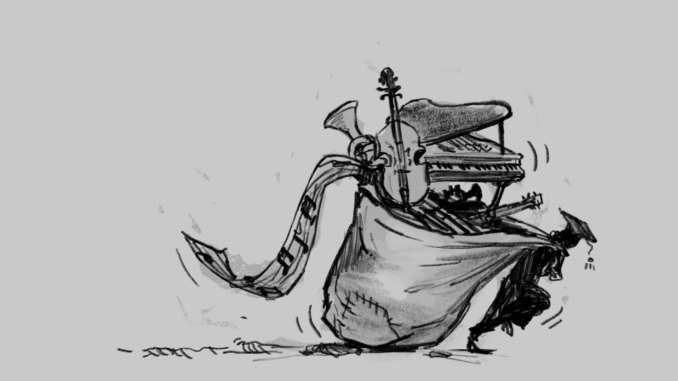
I spend a lot of time thinking about the way that music is taught and talked about in the modern day, and naturally, as a SOAN major, I think a lot about the ways that power, identity and history influence these interactions.
As a liberal arts college located in one of the most progressive cities in the nation, I think it is well-past time that our music department removes the two-semester requirement of History of Western music.
Music education in America and the broader Western education system is rooted in a highly specific European tradition — and unlike many disciplines of the modern day, has yet to grapple with the elitism and racism that is perpetuated by pedagogy.
It is the repertoire that is chosen and played. It is the names of musicians and composers, words and descriptors to convey ideas. It is the rules and theory taught in classes. It is the plethora of economic barriers that decide who is in the room and who is not. It is a hierarchical culture.
All of the aspects mentioned above are deep and systemic, and I am not implying that everything must be changed immediately, nor that it is the responsibility of an individual educator or institution to take on. Most, if not all music educators aim to further musical knowledge that is accessible and relevant to their students. It is rarely an issue of individual intention that is problematic — it is the reality that we are operating in a colonial system that has been unquestioned.
Taking critical stances against music education is not pointing a finger and saying “that’s bad,” it is about examining why things are the way they are and questioning whether these systems are serving current students, teachers and music enjoyers.
While there are a bounty of theoretical, widespread changes that could be implemented to music education, there are also actionable changes that can be made. I believe that adjusting the music degree requirements would be a simple and effective way to implement tangible progress.
Currently, the music minor and major require two semesters of Western music history, covering music in Europe from the medieval period up to the modern classical period by the end of the year. It is worth mentioning that within the class itself, the content is centered around the Christian music tradition.
Why is it required to have such a singular focus on this particular place and time in music? For those who study classical music, it makes sense to understand the origins and history of the music we play. But, the fact of the matter is that not every student is pursuing an education or career in classical music. While I wholeheartedly agree that the tradition of classical music is an incredibly influential and necessary piece of the music of today, I do not think it should be the body around which American music education orbits.
At the end of the day, it reinforces the idea that the music of white, Christian upper-class people is the music that is the most important, complex and valued. There is an additional irony that this expression of racism evokes, in that the culture and musical traditions of those most marginalized have also been the most influential on modern-day music.
For example, the music of Black Americans, from the very first spirituals sung on plantations to the continuing multitudinal evolution of Black music, has irrevocably shaped contemporary music worldwide. In American history, the most popular music has been trailblazed by Black musicians and the African American tradition; blues, jazz, country, rock, soul, R&B, rap, hip-hop.
Often, folks explain the prevalence of Western music history in music education as a product of what has been documented throughout history, and claim that it can therefore be more accurately taught. While having written records of history is integral to education, it ignores the merit of folk music across the globe and in America — music of an oral tradition that has a deep connection to a people, land and history.
The interplay of folk music and western classical music has been going on for centuries. Dvorak wrote his renowned New World Symphony with direct inspiration from Indigenous and African American music. Mendelssohn’s third symphony, commonly referred to as “Scottish Symphony,” echoes folk melodies of the Scottish highlands. Bruch based several of his compositions on Jewish folk music including the prominent cello piece, Kol Nidre.
The LC music department has a wide array of world music ensembles and teachers, and yet these courses are peripheral in the requirements of a music degree at LC. What is it communicating to students when there is a full year covering Western music history and only a one- semester course that covers the rest of the world?
I acknowledge that this critique has biases. Some may interpret this as a hostile attack at the LC music department, but it is out of deep love and interest in music education that I write these words. I believe that dismantling eurocentrism in music is not only necessary to create an inclusive and representative space for students of all backgrounds but imperative to becoming a well-rounded musician.
In my opinion, the LC music degree would be more comprehensive and better serve musicians of all concentrations if MUS 162 (History of Western Music I) and MUS 163 (History of Western Music II) were not major or minor requirements, and the program redirected emphasis on the expansive range of music that exists in the department.

Leave a Reply